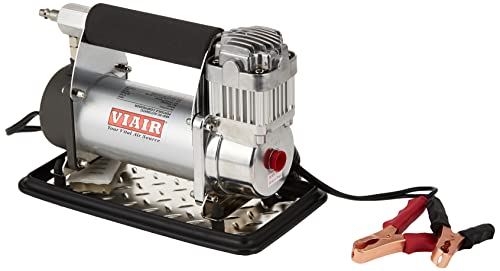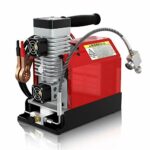
For portable air compressors, the CFM ratings are provided in terms of PSI. For example, an air compressor rated 3CFM at 90 PSI should potentially deliver that 3 CSM at 90 PSI. However, like CFM, manufacturers sometimes advertise the overinflated rate. Now that you know what to look for to find the best portable air compressors for your RV, check out my top five picks! VIAIR 400P-RV Portable Air Compressor for RV This VIAIR is considered by many to be the best tire inflator for RV on the market.
We researched the best portable air compressors for you. The CAT 3-in-1 Portable Air Compressor and Power Station is the perfect choice for RV living. These portable air compressors can inflate most bicycle, automotive and recreational tires, as well as air mattresses, rafts, sports equipment, and more.
So whether you are inflating your tires or those of a stranger in need, topping off the bicycle tires or even filling up an air mattress, you can take the air compressor wherever it is needed. A drawback of onboard air compressors of course is that they are permanently attached to your RV. So if you don’t have an air hose that reaches the item you want to inflate then it will not serve you well. This is a very crucial factor to consider when purchasing an air compressor for your RV because you want to ensure that your air compressor can handle the largest loads required.
Having a reservoir for compressed air means that you can give the air pump a rest while you run air tools or inflate your tires. Some of the best-selling RV air compressors from this company include the Porter-Cable 30-Gallon Single Stage Portable Air Compressor and Porter-Cable C2002 Oil-Free UMC Pancake Compressor. RV Air Compressor Pricing Under $100: These are some of the most affordable RV air compressors you can buy.
best portable air compressor rv Related Question:
What kind of air compressor do I need to winterize my RV?
Volume – not pressure – is what you need. A 20 gallon air compressor is probably more than you’ll need to simply winterize an RV. If you’ve got one that large, it will work fine, but others use much smaller compressors.
Do I need air compressor for RV?
Benefits of Carrying a Portable Air Compressor for RV Travel When your RV travels with too much or not enough tire pressure, they’re more vulnerable to blowouts. You should always make sure you have filled your RV and truck tires to the proper level. Having an air compressor on hand can make that possible.
What should I inflate my RV tires to?
All tires will have their maximum pressure stamped on the sidewall. This is what mine look like, and on these tires (Firestone Transforce) it’s 80 psi. Now, inflating the tires to 80 psi will certainly provide all the load carrying capacity that the tires are capable of.
How much air do you put in motorhome tires?
The tire pressure on an average 16″ RV tire can be anything between 35-80 PSI or 280-550 kPa. That’s a wide range – and you need to find the right number for your specific weight and number of wheels.
What does an air compressor do in an RV?
Convenience. Air compressors for RV tires make your traveling easy and convenient. They are easy to use for inflating your vehicle tires quickly. You can attach the compressor to the cigarette lighter or on your car battery, and it will automatically start inflating the tires.
Should RV tires be inflated to max PSI?
When it comes to trailer tires you always want to have them inflated to their max psi when cold. Not only do you get the full capacity at the max psi, you also will generate less heat in the tire since there won’t be as much flex in the sidewall, you’ll get better wear and better fuel mileage.
What PSI should camper tires be at?
For travel trailers, it is recommended to have a maximum of 85 PSI. Usually, caravans and trailers (new or used) have an owner’s manual that specifies the ideal tire pressure level. Even used trailers have a plate indicating the correct inflation level.
Should I inflate motorhome tires to max PSI?
Never exceed the maximum inflation rating for the wheels/rims or valves when setting the tire cold inflation pressure. Never inflate tires more than 10 PSI above the maximum PSI rating imprinted on the sidewall. Never install tires rated less than required per the Certification Label.
What should the water pressure be for an RV?
The correct water pressure for an RV can vary depending on the model and the condition of your RV’s plumbing system. Modern RVs can handle up to 100 psi of water pressure. However, most RV experts recommend you never let the water pressure exceed 60 psi. Somewhere around 40 to 50 psi is ideal for many RVs.
What should the tire pressure be on a Class A motorhome?
The recommended pressure on the tires is 110 PSI, but all the tires on RV are at 90 PSI. Should I leave them at 90 PSI? Answer: All RVs have a plate somewhere that will tell you what the manufacturer recommends for maximum tire inflation pressure.
How much psi do I need to winterize my RV?
You can use an air compressor to help blow out the water in the lines. If using an air compressor, set it to 30 psi, with a maximum air pressure of 50 psi. Also, walk around your trailer and open up the water valves one at a time when using an air compressor.
Can you winterize RV without antifreeze?
No matter what your reason might be for winterizing your RV sans antifreeze, the process is the same. The goal with this winterization method is to remove as much water as possible from the lines and tanks. This is done using an air compressor to blow the lines out after emptying all tanks.
Can I use car antifreeze in my RV?
Ethylene Glycol Antifreeze Ethylene glycol is a very toxic component that is not safe for RVs. Typically, this chemical is seen in automotive antifreeze, and it should only be used in automobiles, not the holding tanks of recreational vehicles.
Is it better to winterize RV with air or antifreeze?
When a rig is stored in sub-freezing climates for an extended period, winterizing with antifreeze is the better option as it’s more protective to the entire water system. Running the antifreeze through all of the plumbing in the RV ensures that every component is protected. What is this?
How cold does it have to be for RV lines to freeze?
As a general rule, the water in an RV’s pipes could freeze when the temperature dips below 32 degrees Fahrenheit for a day. But in many cases, it would need to get well below 30 for an extended period of time for most RV pipes to freeze.

